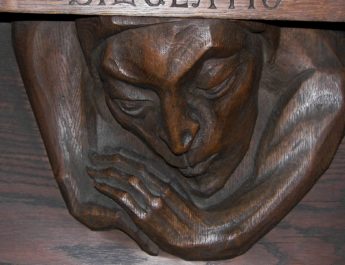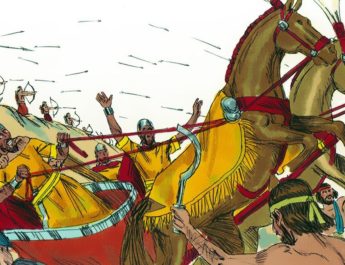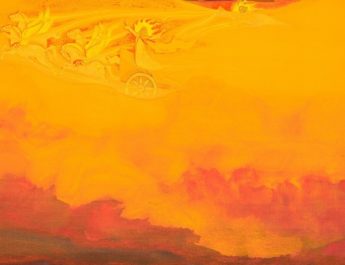2 Samuel 23:1-7
Reign of Christ B
1 Now these are the lastA wordsB of David:C
A “last” = acharon. From achar (to be behind, delay, be late, procrastinate, continue). This is end, last, coming behind, to loiter, later. It can also refer to the west.
B “words” = dabar. From dabar (to speak, declare, discuss). This is speech, a word, a matter, an affair, charge, command, message, promise, purpose, report, request. It is a word, which implies things that are spoken of in a wide sense.
C “David” = David. From the same as dod (beloved, love, uncle); the root may mean to boil, which is used figuratively to describe love. So, this implies someone you love such as a friend, a lover, or a close family member like an uncle. David’s name likely means something like “beloved one.”
The oracleD of David, sonE of Jesse,F
the oracle of the manG whom God exalted,H
D “oracle” = neum. From na’am (to speak a prophecy; properly, to whisper, which implies saying an oracle). This is an utterance or speaking an oracle.
E “son” = ben. From banah (to build or obtain children). This is son, age, child. It is son in a literal or figurative sense.
F “Jesse” = Yishay. Perhaps from ish (man); {perhaps from enosh (human, humankind, mortal); from anash (to be weak, sick, or frail)} OR from the same as yesh (being, existence, substance). This is Jesse, a name which means “my husband” or “the Lord exists.” See https://www.abarim-publications.com/Meaning/Jesse.html
G “man” = geber. From gabar (to be strong or mighty; to prevail or to be insolent) This is man, warrior, a person generally, or a valiant person.
H “exalted” = qum + al. Qum is to arise, stand, accomplish, establish, abide. This is rising as in rising against, getting up after being sick or asleep, arising from one state to another, becoming powerful, or rising for action. It can also be standing in a figurative sense. Al is 4x in OT. From alah (to go up, ascend, be high, be a priority; to arise in a literal or figurative sense). This is upward, the top, aloft, highest, to God.
the anointedI of the GodJ of Jacob,K
the favoriteL of the Strong OneM of Israel:N
I “anointed” = mashiach. From mashach (to smear or anoint; to run oil on, to consecrate). This is the anointed or consecrated one. So, it could refer to a king, priest, or saint. It is also the root of the word “messiah.”
J “God” = Elohim.
K “Jacob” = Yaaqob. From the same as aqeb (heel, hind part, hoof, rear guard of an army, one who lies in wait, usurper). This is Isaac’s son and his descendants. The name means heel-catcher or supplanter.
L “favorite” = na’iym. 13x in OT. From na’em (to be pleasant or lovely; to surpass in beauty; to be delightful in a literal or figurative sense). This is sweet, lovely, or delightful.
M “Strong One” = zamir. 7x in OT. From zamar (making music; used specially of music to worship God; music with singing, singing praise, singing psalms); may be from zamar (to trim or prune). This is a song, psalm, or other music accompanied with instruments.
N “Israel” = Yisrael. Related to “God” in v1. From sarah (to persist, exert oneself, contend, persevere, wrestle, prevail) + el (see note J above). This is Israel, meaning God strives or one who strives with God; new name for Jacob and for his offspring. This refers to the people and to the land.
2 The spiritO of the LordP speaksQ through me,
his wordR is upon my tongue.S
3 The God of Israel has spoken,
the RockT of Israel has saidU to me:
O “spirit” = ruach. This is breath, wind, air, cool, spirit. This is wind, which resembles the breath and so this can be used figuratively for life itself or being frail/mortal/impermanent. It can refer to the air of the sky or the spirit.
P “Lord” = YHVH. From havah (to be, become) or hayah (to come to pass, become, be). This is the name of the God of Israel, the self-existent and eternal one, the tetragrammaton. This pronunciation has been lost to time so “Lord” is generally used in its place.
Q “speaks” = dabar. Related to “words” in v1. See note B above.
R “word” = millah. From malal (to say, speak; often used in a poetic sense). This is something said – a word, speech, talking, or discourse.
S “tongue” = lashon. This is tongue, talker, language, or wedge. It can also be a tongue of flame or a water cove.
T “Rock” = tsur. From tsur (to confine, cramp, or bind in a literal or figurative sense; to besiege, assault, or distress). This is rock, stone, cliff, boulder, rocky. It can also be a refuge, a way to refer to God.
U “said” = dabar. Same as “speaks” in v2. See note Q above.
One who rulesV over peopleW justly,X
ruling in the fearY of God,
4 is like the lightZ of morning,AA
V “rules” = mashal. This is to rule, reign, govern, have authority, wield.
W “people” = adam. Perhaps from adam (to be red, make ruddy); related to adamah (ground, dirt, earth). This is man, humankind, also Adam’s name. It refers to a human individual or humanity.
X “justly” = tsaddiq. From the same as tsedeq (rightness, righteousness, just cause, vindication; that which is right in a natural, moral, or legal sense; abstractly equity; figuratively prosperity). This is just, innocent, righteous, righteous one, or lawful.
Y “fear” = yirah. From yare (to fear, be afraid, dreadful; also fearful reverence – to fear in a moral sense is to say to revere, respect). This is fear or reverence.
Z “light” = or. From or (to be or become light). This is light, sun, sunshine, dawn, or daylight. Figuratively, it can refer to light from instruction, light of a face (that is to say one that is cheerful or finds favor). It can refer to prosperity or salvation; a light that guides, a light eternal from Zion.
AA “morning” = boqer. From baqar (to seek, plow, break forth, admire, care for). This refers to the break of day. So it is dawn, early, morning, or morrow.
like the sunBB risingCC on a cloudlessDD morning,
gleamingEE from the rain on the grassyFF land.GG
BB “sun” = shemesh. This is sun or toward the east. Its root may mean being brilliant. Figuratively, this could be a ray or an arch.
CC “rising” = zarach. 18x in OT. This is to rise, shine, or dawn. It can also be used to describe symptoms of leprosy.
DD “cloudless” = lo + ab. Ab is perhaps from uwb (to be a think or dark cloud, a cloud covering). This is a dark or thick cloud that can envelope in darkness. It can also refer to a copse or to clay.
EE “gleaming” = nogah. 19x in OT. From nagah (to shine – root may mean to glitter). This is light, radiance, being bright, sunshine.
FF “grassy” = deshe. 15x in OT– including “vegetation” from Genesis 1:11-12. From dasha (to sprout, grow green). This is grass, a shoot, or a tender herb.
GG “land” = erets. Root may mean to be firm. This is earth, ground, field land, or country.
5 Is not my houseHH like thisII with God?JJ
HH “house” = bayit. Related to “son” in v1. Probably from banah (see note E above). This is house, court, family, palace, temple.
II “this” = ken. Perhaps from kun (properly, in a perpendicular position; literally, to establish, fix, fasten, prepare; figuratively, it is certainty, to be firm, faithfulness, render sure or prosperous). This is to set upright. Generally used figuratively to mean thus, so, afterwards, rightly so.
JJ “God” = El. Related to “God” and “Israel” in v1. See note N above.
For he has madeKK with me an everlastingLL covenant,MM
orderedNN in all things and secure.OO
KK “made” = sim. This is to put or place in a literal or figurative sense. It can be appoint, care, change, make, and may other things.
LL “everlasting” = olam. This is a long scope of time whether in the past (antiquity, ancient time) or in the future (eternal, everlasting).
MM “covenant” = berit. Perhaps from barah (to eat, choose, make clear); perhaps from bar (grain, wheat); from bara (to select, purify, cleanse, test, brighten, polish). This is a compact, covenant, alliance, treaty, or league.
NN “ordered” = arak. This is to arrange by setting in a row. It can also mean to set a battle, estimate, put in order, or compare.
OO “secure” = shamar. This is to keep, watch, or preserve. It means to guard something or to protect it as a thorny hedge protects something.
Will he not cause to prosperPP
all my helpQQ and my desire?RR
PP “cause to prosper” = tsamach. This is to sprout, grow, or spring up – literal or figurative.
QQ “help” = yesha. From yasha (to deliver, defend, help, preserve, rescue, be safe. Properly, to be open, wide or free, which implies being safe. Used causatively, it means to free). This is salvation, deliverance, rescue, safety, welfare, liberty.
RR “desire” = chephets. From chaphets (properly, inclined towards or bending to; figuratively, to desire, delight in, or be pleased with). This is a delight, care, or pleasure. It is what you desire or what is acceptable. It can also be used concretely for a precious thing or something that one is thinking about.
6 But the godlessSS are all like thornsTT that are thrown away;UU
for they cannot be picked upVV with the hand;WW
SS “godless” = beliyyaal. From beli (lack, nothing, without, wearing out, failure, destruction); {from balah (to grow old, wear out, waste away, consume, spend)} + yaal (to gain, profit, do good, ascend, be useful or valuable; benefitted). This is lacking profit i.e. worthlessness, destruction, evil, ungodly person, wickedness, or Belial.
TT “thorns” = qots. 12x in OT. Perhaps from quts (summer, clip off); from qayits (fruit, harvest, dry season). This is a thorn or thornbush.
UU “thrown away” = nadad. This is to wave back and forth. Figuratively, it is to flee, stray, flutter chase away, shake, or shrink. It can also refer to a fugitive.
VV “picked up” = laqach. This is to take, accept, carry away, receive. It can also have the sense of take a wife or take in marriage.
WW “hand” = yad. This is hand, ability, power. Hand in a literal sense, but also what one can do or the means by which one does it.
7 to touchXX them oneYY usesZZ an iron barAAA
or the shaftBBB of a spear.CCC
XX “touch” = naga. This is touch, reach, arrive, come near, strike. This is touching for any reason including sexual or violent.
YY “one” = ish. Perhaps from enosh (human, humankind, mortal); from anash (to be weak, sick, or frail). This is man, husband, another, or humankind.
ZZ “uses” = male. This is fill, satisfy, replenish, accomplish, fulfill, confirm, or consecrate. It is fill in a literal or figurative sense.
AAA “iron bar” = barzel. From the same as Birzoth (a name meaning holes). Root may mean to pierce. This is iron as something used as a cutting implement. It can also specifically mean ax head.
BBB “shaft” = ets. Perhaps from atsah (to shut, fasten, firm up, to close one’s eyes). This is tree or other things related to trees like wood, sticks, or stalks. It can also refer to wood products like a plank or staff or gallows. Additionally, this can refer to a carpenter.
CCC “spear” = chanith. From chanah (to decline, bending down, or living in tents; can be camping to create a home or camping as a part of battle). This is a spear or lance as a weapon that is thrust in the same way one pitches a tent.
And they are entirely consumedDDD in fireEEE on the spot.FFF
DDD “entirely consumed” = saraph + saraph. This is to burn or kindle. This is the root that “seraphim” comes from. The word is repeated twice – the first time as an Infinitive Absolute. The Infinitive Absolute serves to emphasize the sentiment of the word. It is rather like Foghorn Leghorn’s speech pattern, “I said, I said.”
EEE “fire” = esh. This is fire, burning, flaming, hot. It is fire in a literal or figurative sense.
FFF “spot” = shebeth. 5x in OT. From yashab (to sit and so to remain and so to dwell; sitting for any reason – as a judge, in order to ambush, or just sitting quietly; can mean settling or marrying; continue, endure, or establish). This is a seat, site, or abode.
Image credit: “King David” by Vladimir Borovikovsky, 1785.




